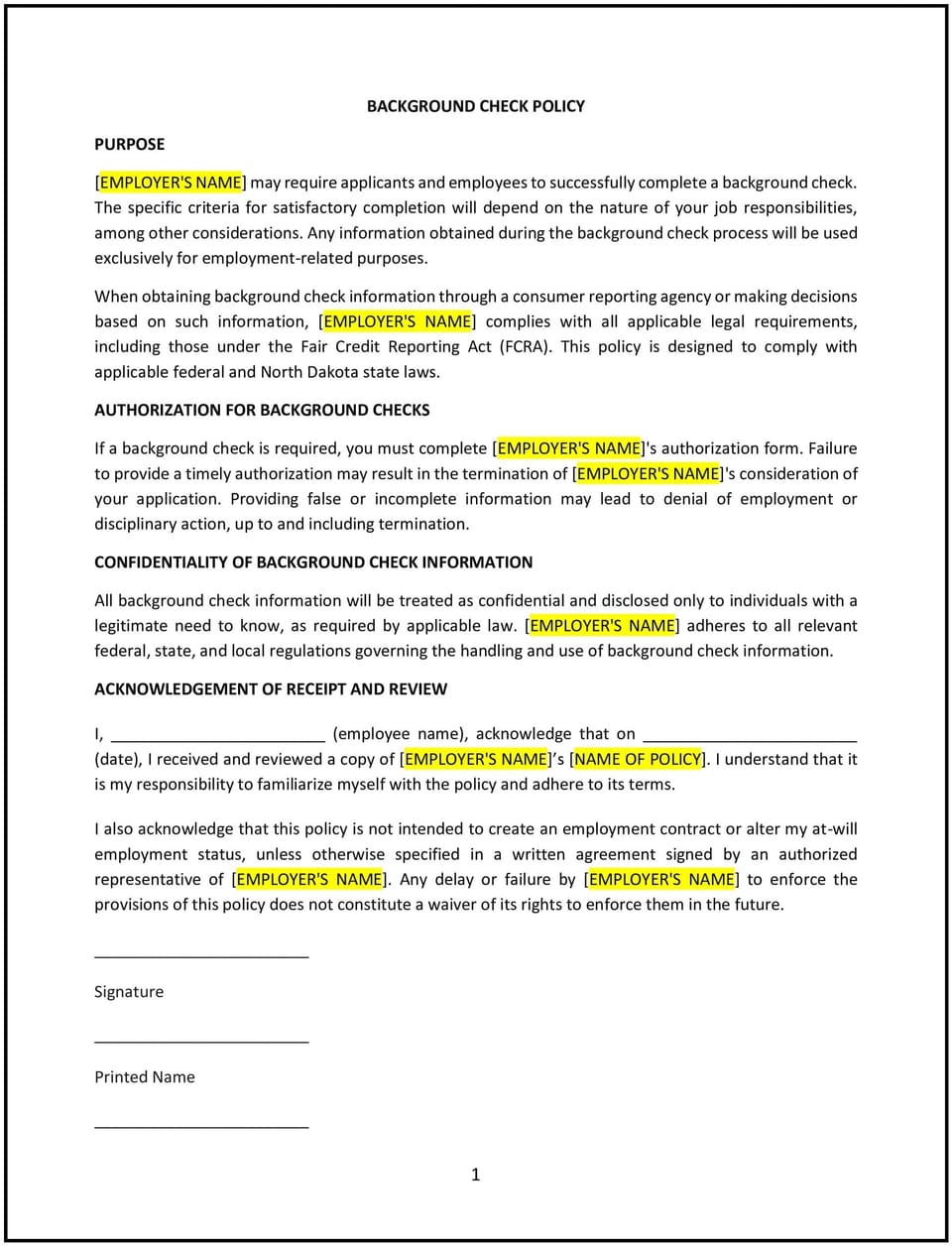Background check policy (North Dakota): Free template

Background check policy (North Dakota)
This background check policy is designed to help North Dakota businesses establish clear guidelines for conducting pre-employment and ongoing background screenings. The policy outlines when background checks may be required, the types of screenings conducted, and employee rights regarding background verification.
By implementing this policy, businesses can improve hiring decisions, protect workplace security, and maintain compliance with applicable laws.
How to use this background check policy (North Dakota)
- Define background check requirements: Specify which positions require background screenings and the types of checks performed (e.g., criminal history, credit checks, education verification).
- Establish consent procedures: Require candidates to provide written authorization before conducting a background check.
- Clarify timing: Outline when background checks are conducted, such as during hiring, promotions, or as required by law.
- Address adverse findings: Define how businesses will handle issues discovered in a background check.
- Ensure confidentiality: Protect the privacy of employees and candidates by securely storing background check results.
- Comply with legal requirements: Align with North Dakota state laws and federal Fair Credit Reporting Act (FCRA) regulations.
- Review regularly: Update the policy based on changes in legal requirements and business needs.
Benefits of using this background check policy (North Dakota)
Implementing this policy provides several advantages for North Dakota businesses:
- Improves hiring decisions: Helps businesses verify candidate qualifications and suitability for roles.
- Enhances workplace security: Reduces risks by identifying potential concerns before hiring.
- Supports compliance with employment laws: Aligns with state and federal regulations on background screenings.
- Protects candidate privacy: Ensures secure handling of personal background check information.
- Reflects North Dakota-specific hiring considerations: Addresses industry-specific background check requirements.
Tips for using this background check policy (North Dakota)
- Obtain candidate consent: Ensure all applicants sign a written authorization form before background screening.
- Follow adverse action procedures: Notify candidates of any findings that may impact their employment eligibility.
- Maintain accurate records: Keep background check results secure and confidential.
- Train hiring managers: Educate staff on legal background check requirements and non-discrimination policies.
- Adjust as needed: Update policies based on changes in North Dakota laws or hiring practices.
Q: When are background checks required?
A: Businesses should determine whether checks are required for all positions or only for roles involving financial, security, or customer-facing responsibilities.
Q: What types of background checks are included?
A: Businesses should specify screenings such as criminal history, credit reports, employment verification, and education confirmation.
Q: How should businesses handle adverse findings?
A: Businesses should provide candidates with an opportunity to explain any negative results before making final hiring decisions.
Q: Can businesses conduct background checks on current employees?
A: Yes, businesses should clarify if screenings are required for promotions, transfers, or ongoing security reviews.
Q: How long should background check records be retained?
A: Businesses should follow North Dakota recordkeeping laws and securely store results for a specified period.
Q: How often should this policy be reviewed?
A: The policy should be reviewed annually or as needed to align with legal updates and hiring best practices.
This article contains general legal information and does not contain legal advice. Cobrief is not a law firm or a substitute for an attorney or law firm. The law is complex and changes often. For legal advice, please ask a lawyer.


